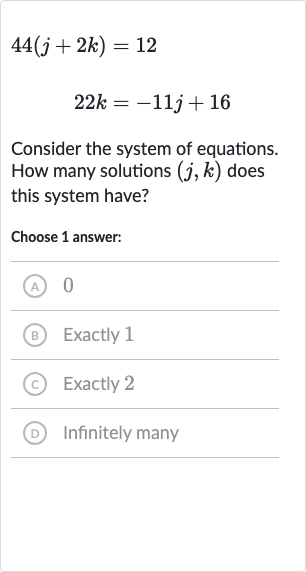AI tutor
Welcome to Bytelearn!
Let’s check out your problem:

Consider the system of equations. How many solutions does this system have?Choose answer:(A) (B) Exactly (C) Exactly (D) Infinitely many
Full solution
Q. Consider the system of equations. How many solutions does this system have?Choose answer:(A) (B) Exactly (C) Exactly (D) Infinitely many
- Simplify the first equation: Simplify the first equation.The first equation is . To simplify, divide both sides by to isolate .
- Simplify the second equation: Simplify the second equation.The second equation is . To simplify, divide both sides by to isolate .
- Compare the two simplified equations: Compare the two simplified equations.We have and . We can substitute the expression for from the second equation into the first equation to solve for .
- Solve for j: Solve for j.Distribute the in the first equation:Notice that cancels out, leaving us with:
- Check for consistency: Check for consistency.We see that does not equal . This means that there is no value of that can satisfy both equations simultaneously.
- Determine the number of solutions: Determine the number of solutions.Since there is no value of that can satisfy both equations, there is no solution to the system of equations.
